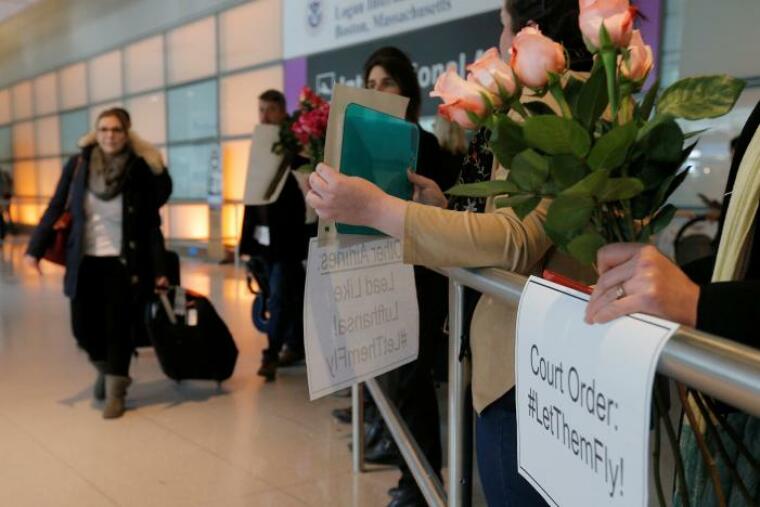World Relief prepares to close five offices and lay off 140 staff in wake of Trump's refugee order

A Christian organization that helps resettle refugees is preparing to close five of its offices and lay off 140 staff members as a result of President Donald Trump's executive order on immigration and refugees.
World Relief, which is one of nine private agencies contracted with the U.S. government to resettle refugees, announced on Wednesday that it will be closing the offices in Boise, Idaho; Columbus, Ohio; Miami, Florida; Nashville, Tennessee; and Glen Burnie, Maryland. In total, the five offices had resettled more than 25,000 refugees.
Matthew Soerens, U.S. director of church mobilization at World Relief, said that the offices were chosen in part because other refugee resettlement agencies are already working nearby.
He told Religion News Service that some of the staff have already been laid off before the announcement. The rest of the layoffs and closures will be implemented "gradually" as the organization continues to fulfill its responsibilities to recently resettled refugees and its church partners.
Last Week, World Relief brought together more than 500 evangelical leaders to sign an open letter decrying the executive order on refugees.
The order has been blocked by the Ninth Circuit Court, but it only suspends the 120-day ban on refugee resettlement. It still effectively limits the number of refugees that will be allowed to enter the U.S. in 2017 at 50,000. According to the New York Times, about 30,000 refugees have already been admitted for the fiscal year of 2017, which started in October.
World Relief had expected to resettle 11,000 refugees this year, but Soerens said that the number will likely drop to 5,000, most of whom have already been resettled.
The organization receives a $2,025 grant for each refugee it resettles from the U.S. State Department. Soerens said that World Relief is anticipating an increase in donations from churches and individuals, but the organization still needs to cut expenses.
In an interview with The Christian Post, Soerens said that the layoffs and office closures alone will not be enough to help the organization overcome the loss of revenue resulting from the new refugee limit.
"We have always received some of our support from the federal government but we have always received significant support from local churches and private individuals," he said. "Our ability to sustain our infrastructure for refugees is really going to have to rely more heavily on churches and individuals right now," he added.
 Christians don't have to affirm transgenderism, but they can’t express that view at work: tribunal
Christians don't have to affirm transgenderism, but they can’t express that view at work: tribunal Archaeology discovery: Medieval Christian prayer beads found on Holy Island
Archaeology discovery: Medieval Christian prayer beads found on Holy Island Presbyterian Church in America votes to leave National Association of Evangelicals
Presbyterian Church in America votes to leave National Association of Evangelicals Over 50 killed in 'vile and satanic' attack at Nigerian church on Pentecost Sunday
Over 50 killed in 'vile and satanic' attack at Nigerian church on Pentecost Sunday Ukrainian Orthodox Church severs ties with Moscow over Patriarch Kirill's support for Putin's war
Ukrainian Orthodox Church severs ties with Moscow over Patriarch Kirill's support for Putin's war Islamic State kills 20 Nigerian Christians as revenge for US airstrike
Islamic State kills 20 Nigerian Christians as revenge for US airstrike Man who served 33 years in prison for murder leads inmates to Christ
Man who served 33 years in prison for murder leads inmates to Christ


 Nigerian student beaten to death, body burned over ‘blasphemous’ WhatsApp message
Nigerian student beaten to death, body burned over ‘blasphemous’ WhatsApp message 'A new low': World reacts after Hong Kong arrests 90-year-old Cardinal Joseph Zen
'A new low': World reacts after Hong Kong arrests 90-year-old Cardinal Joseph Zen Iran sentences Christian man to 10 years in prison for hosting house church worship gathering
Iran sentences Christian man to 10 years in prison for hosting house church worship gathering French Guyana: Pastor shot dead, church set on fire after meeting delegation of Evangelicals
French Guyana: Pastor shot dead, church set on fire after meeting delegation of Evangelicals ‘Talking Jesus’ report finds only 6% of UK adults identify as practicing Christians
‘Talking Jesus’ report finds only 6% of UK adults identify as practicing Christians Mission Eurasia ministry center blown up in Ukraine, hundreds of Bibles destroyed: 'God will provide'
Mission Eurasia ministry center blown up in Ukraine, hundreds of Bibles destroyed: 'God will provide' Church holds service for first time after ISIS desecrated it 8 years ago
Church holds service for first time after ISIS desecrated it 8 years ago Burger King apologizes for 'offensive campaign' using Jesus' words at the Last Supper
Burger King apologizes for 'offensive campaign' using Jesus' words at the Last Supper Uganda: Muslims abduct teacher, burn him inside mosque for praying in Christ’s name
Uganda: Muslims abduct teacher, burn him inside mosque for praying in Christ’s name